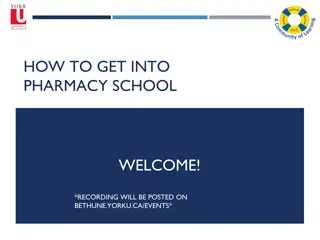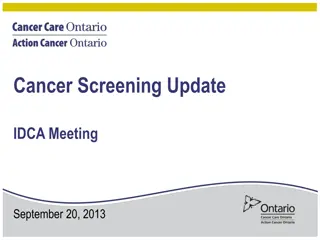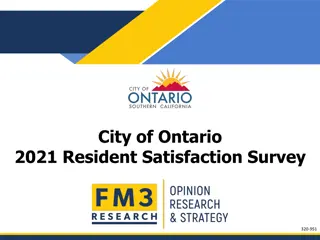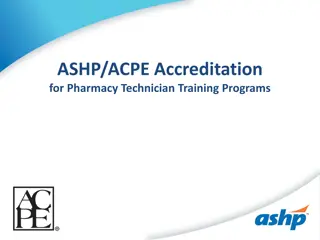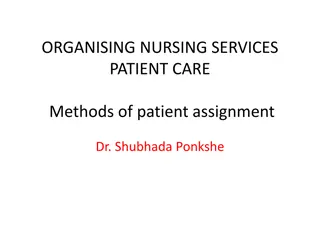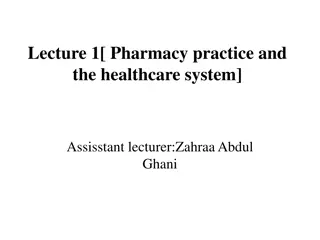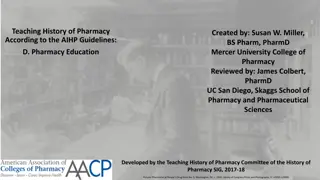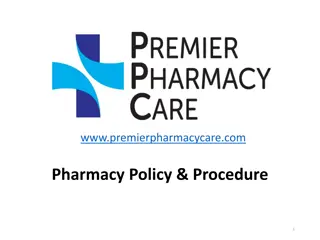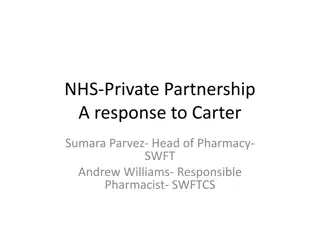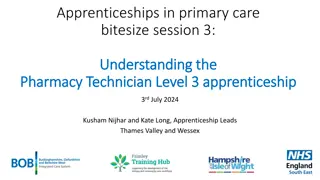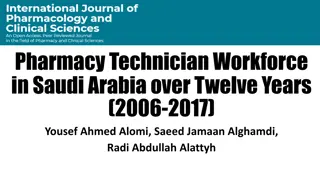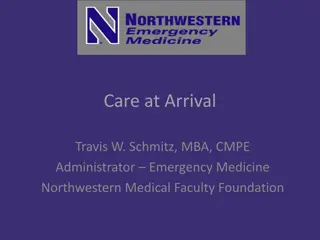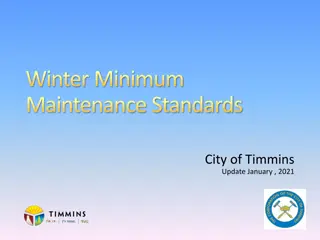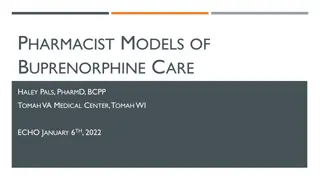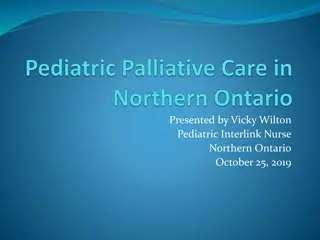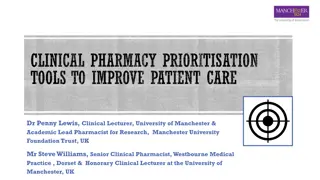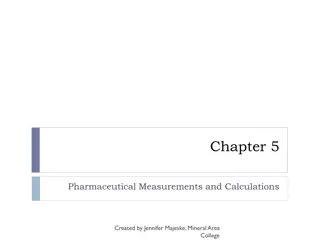Ontario Pharmacy Patient Care Assessment Tool (OPPCAT) Collaboration Project
This collaborative province-wide project involves the development, implementation, and evaluation of the Ontario Pharmacy Patient Care Assessment Tool (OPPCAT). The initiative brings together various stakeholders including the University of Toronto, University of Waterloo, Ontario Hospital Pharmacy Residency Programs, and the Ontario College of Pharmacists. The project timeline, objectives, and implementation details are outlined, showcasing the teamwork and dedication involved in improving pharmacy patient care assessment in Ontario.
Download Presentation

Please find below an Image/Link to download the presentation.
The content on the website is provided AS IS for your information and personal use only. It may not be sold, licensed, or shared on other websites without obtaining consent from the author. Download presentation by click this link. If you encounter any issues during the download, it is possible that the publisher has removed the file from their server.
E N D
Presentation Transcript
A Collaborative Province-Wide Pharmacy Assessment Project Ontario Pharmacy Patient Care Assessment Tool (OPPCAT) Annie Lee, Associate Professor, Teaching Stream Leslie Dan Faculty of Pharmacy, University of Toronto Henry Halapy, Residency Coordinator, St. Michael s Hospital & Lecturer, Leslie Dan Faculty of Pharmacy, University of Toronto
Ontario Pharmacy Patient Care Assessment Tool (OPPCAT) - Collaborators Hospital Pharmacy Residency Forum of Ontario Diana Spizzirri Henry Halapy Annie Lee Ken Manson University of Toronto Ontario College of Pharmacists Hospital Pharmacy Residency University of Waterloo
Objectives for this Session: Describe the collaborative nature of OPPCAT work Describe the development, implementation and evaluation of OPPCAT
Collaboration University of Toronto, University of Waterloo, Ontario Hospital Pharmacy Residency Programs and the Ontario College of Pharmacists At the right time and place Sharing of ideas and human resources
Collaboration Similar goal and outcomes Common need led to moving forward quickly with less formal collaboration Working group established as natural evolution More formality and structure introduced after tool implemented
OPPCAT Development Timeline Spring 2014 Fall 2015 Version 5 tested with focus groups January 2017 Initial July 2016 Hospital residency launch discussion by residency programs and universities Satisfaction Survey Fall 2014 Include licensing body May 2016 January 2017 January 2018 University of Toronto launch Version 6 University of Waterloo and Ontario College of Pharmacists launch Data analysis and revision
Implementation in Programs Advanced Pharmacy Practice Experience (APPE) in PharmD and PharmD for Pharmacists Programs University of Toronto Hospital Pharmacy Residency Programs Patient Care Rotations in Ontario University of Waterloo Patient Care Rotations in 4thyear PharmD and PharmD Bridging Programs Ontario College of Pharmacists Practice Assessment of Competence at Entry (PACE)
University of Toronto - Advanced Pharmacy Practice Experience (APPE) Full-time PharmD Program (35 weeks) 2 x 5 week institutional 10-week community pharmacy 1 x 5 week other direct patient care 2 x 5 week electives Direct patient care Non-direct patient care PharmD for Pharmacists 20 25 weeks direct patient care
APPE Assessment OPPCAT for direct patient care rotations Mid-point and final assessment completed in CORE ELMs Preceptor assessment and student self- assessment Rotations are individually graded
Expected Level of Performance of Students Provides guidance for expected level of patient care responsibilities Specific for institution and community pharmacy practice Acknowledges patient complexity and care needs Adaptable to patient care setting Expectations must be discussed and outlined in learning contract
University of Waterloo - PharmD Experiential Learning Patient Care Rotations in a Community of Practice 3 x 8 week direct patient care rotations in 4th year of program (in 14 regions throughout Ontario) Week 4 Mid-point student self-assessment and preceptor assessment Week 8 Final student self-assessment and preceptor assessment Rotations are individually graded
Ontario College of Pharmacists In 2017, new model of assessment: Practice Assessment of Competence at Entry (PACE) PACE is assessment first then, if needed, individualized self-directed development with a coach to address any identified areas of performance under key competencies Pass/fail decisions to be made according to a set cut score Determine readiness for practice vs need for further development
1 week 2-3 weeks
Pharmacy Residency Programs are 1 year post-graduate programs done after completion of entry-to-practice degree Focused on developing clinical practice, leadership, and project skills Typically in hospital setting, but can be in other settings
Residency Adaptation of OPPCAT Residency programs affiliated with an Ontario university OPPCAT supported by Hospital Pharmacy Residency Forum of Ontario (HPRFO) High adoption rate by residency programs -12/15 Working on Level and Ranges document to accompany OPPCAT
OPPCAT Tool Standards Canadian Pharmacy Residency Board Standard NAPRA Entry-to- Practice Competencies AFPC Educational Outcomes Framework Competency based framework Literature review Solo taxonomy Domains, elements and behavioural descriptors Five point Likert scale Companion glossary
OPPCAT 5 Domains and 20 Elements Patient Care (8) Practice Communication and Education (4) Management (3) Professional Collaboration (3) Professionalism (2)
Domain Rating Scale Element Behavioural Descriptor
Domain and Elements Communication and Education Patient Care Develops Patient Relationships Conducts Patient Assessment Identifies Drug Therapy Problems Makes Clinical Decisions Implements Care Plans Refers Patients Provides Follow-up and Evaluates Care Promotes/Advocates for Patient Health & Wellness Demonstrates Communication Skills Completes Documentation Demonstrates Presentation Skills Provides Student Mentorship
Domains and Elements Professional Collaboration Professionalism Applies Regulations and Ethical Principles Demonstrates an Awareness of One s Own Practice Limitations Develops and Promotes Inter-/Intra-professional Relationships Fulfills Professional Roles and Responsibilities within Healthcare Team Demonstrates Leadership
Domains and Elements Practice Management Prioritizes Patient Care Responsibilities to Manage Patient Workload Manages Drug Dispensing Demonstrates Patient and Medication Safety Overall Assessment Global Rating Scale
Behavioural Descriptors Each descriptor has 3 components: Guidance / support required Effectiveness / quality Consistency Demonstrate progression from levels 1 to 5
Guidance Gradient (in Glossary) Significant Some Minimal Takes initiative readily Uses judgement appropriately Preceptor intervenes infrequently Regularly demonstrates one to two positive characteristics Difficulty taking initiative; requires frequent prompting Inappropriate judgement Preceptor intervenes regularly
Current Preceptor/Assessor Training on OPPCAT U of T UW OCP Residency 1. Pre-workshop (readings, training videos/modules) 2. Self-assessment prior to In-person workshop 3. In-person Workshop (after completing #1) (train the trainer) (after completing #1 & 2) 4. On-line Workshop (Articulate) (alternative to #3) (alternative to #3)
Fall 2017 - Preceptor Development Working Group Sub-committee formed under original OPPCAT group Objectives: Take inventory of resources utilized by each program Evaluate a platform for delivering on-line training Review existing video resources online
Fall 2017 - Preceptor Development Working Group Objectives cont d: Create a video focusing on guidance terms Consider a common certificate of completion or a designation for pharmacists Assessing the need for an OPPCAT preceptor update module
OPPCAT Satisfaction Survey Results P/A = Preceptors/Assessors S/R = Students/Residents Questions P/A (n=171) S/R (n=69) The layout was clear 92% (YES) 91% (YES) The guidance terms were clear 97% * 92%* The assessment form accurately captures learner performance 91%* 82%* Missing content that should be included 82% (NO)** 85% (NO) Overall satisfaction 91%* 85%* *Percentage of neutral/agreed/strongly agree responses ** Note: majority of residency preceptors indicated missing content to be assessed
Survey Results Points to Consider Adding not applicable for some programs Too long and difficult filling out form (fillable PDF) from residency preceptors/ residents Site freezes or hard to log on - from OCP assessors Modifying some behaviour descriptors in the Patient Care domain Assessing specific knowledge or behaviours from residency preceptors
Work in Progress Revising OPPCAT to Version 7 Standardizing preceptor training across programs Validating OPPCAT Drafting a publication Disseminating OPPCAT to programs across Canada
Collaboration Lessons Learned Collaboration possible due to the shared commitment and investment Timing was important i.e. right time and place Need patience and perseverance Different organizations need to ensure buy-in across all leadership teams
Collaboration Lessons Learned Funding/financial support for work as it evolves Online assessment tool consider technology solution/platform across all organizations Standardization of tool through combined preceptor training and shared resources
Questions? Contact Information: Annie Lee awm.lee@utoronto.ca Henry Halapy halapyh@smh.ca




